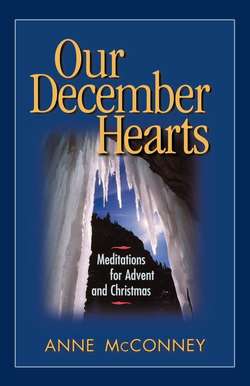Читать книгу Our December Hearts - Anne McConney - Страница 9
На сайте Литреса книга снята с продажи.
NOVEMBER 30 WRESTLING WITH THE ANGEL
ОглавлениеSometimes I go back and read what I have written and I am appalled. Who is this person who writes for all the world as if she knew what she was talking about? This writer who speaks of cosmic mysteries with only the refractory tool of language in her hand? She is not anyone I know.
For I know myself to be a trembler on the brink, sometimes hearing whispers from behind the sky, sometimes seeing a flash of silver like a fish disappearing into dark seas, sometimes merely confused amid messages sung in sunlight and bee-drone. News of the infinite comes through in no grammar known to us. We translate crudely and sometimes not at all.
Yet translate we must. We human beings, it seems, have opted for meaning. We have said that to exist is not enough; we must also understand our existence. We must define this place of wonder where we have, all amazed, found ourselves, this universe where God spreads forth beauty in uncountable shapes, where the cosmic Christ touches new sunfires into being, where the Spirit flows and flames and is never still. If language is the means we must use, then we will use it, though we know it to be a harsh angel met in a lonely place. We will wrestle it through the night and leave lamed and exhausted and unsure of the blessing, but we will speak.
We can do nothing else. Language is the means by which we perceive our own reality. It is our incantation against the dark as if—as theological writer Dr. Peter Hawkins has written—“to fall silent is to disappear into the void from which we first spoke ourselves into existence.” Words are our weaponry in the enduring battle against chaos and the meaninglessness that always seems ready to reclaim us. Our scriptures teach that God spoke the universe into being, that Christ is the Logos, the eternal Word. We define ourselves—and everything else—by means of language.
We not only define ourselves by means of language—we are in turn defined by it. We live our lives within the boundaries of those ideas and mind patterns that our language or languages can express. This tool we have devised—this wondrous, flexible, and complex tool made to move us beyond our immediate sensory experience, this invention crafted so that our wisdom (yes, and our foolishness too) shall not be lost, this door we have opened on a larger life—is also the door that closes against us. We have chosen to know ourselves and our world and to pass our knowledge to others. We have chosen to live by words, which means that we have chosen to live by symbols.
We live in what philosopher and essayist Francis Bacon called the mundus alter, which is not the world as it is but the world as it is perceived, the world tagged with definitions and expectations, interpretations and memories of past experiences, our own and those of others. The mundus alter is the matrix of education, art and culture, and nearly everything we know of the mundus alter is mediated to us through words, which is to say that it is mediated through symbols. Our knowledge of everything but our most immediate surroundings comes to us at one, and often at two, removes.
Animals share in our experience of pleasure and pain, but it is we humans who define and therefore go haunted by meaning all our days. It is we, tenants of a pitiless and intricate world, balanced on pillars of bone beneath a sky full of fires, who have become the guardians of meaning and thus also the guardians of the pain and joy of our world. We define them and thereby suffer them, not in the body alone but in the far more profound reaches of the mind. And then we do an odd and remarkable thing. We make poetry of them.
Poetry is, after all, nothing but a desperate and often foredoomed attempt to compel language beyond its natural barriers, to cajole and force and brutalize it into carrying meaning heavier than it was designed to bear. We search for the reality that is beyond all symbols with only words—those slippery and elusive and sometimes rough-hewn tools—at our command. We do not speak with wisdom, we do not write with truth, but we do as well as we can.
We wrestle with the angel. Perhaps it is enough.
